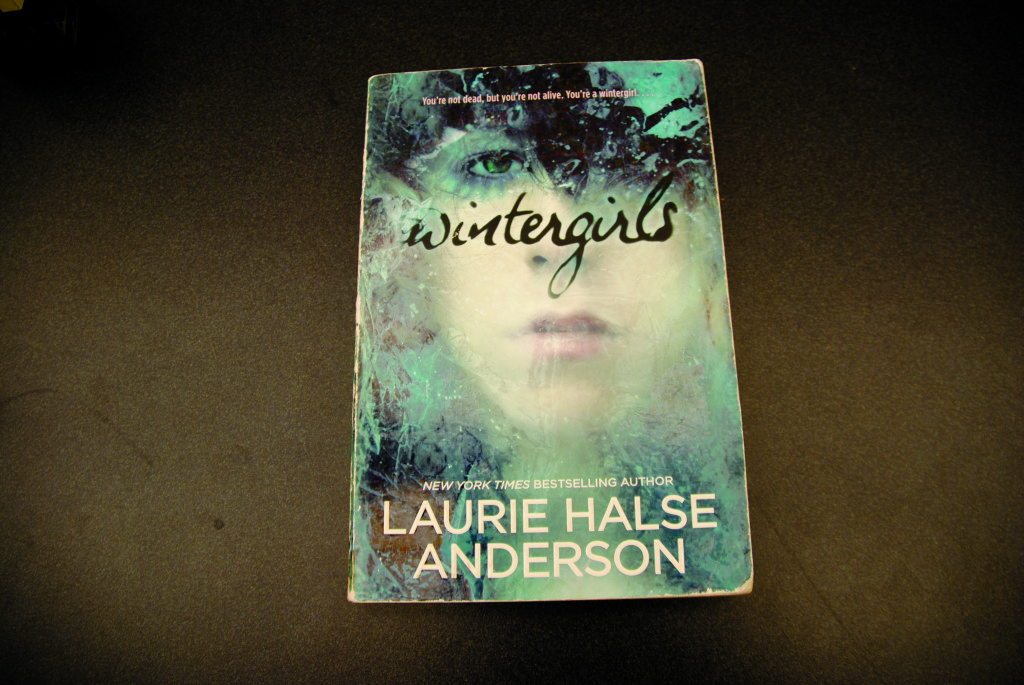S.L. FULLER
Editor in Chief
Name: Meredith Nugent
Year: Senior
Major: Biology
Essay: “Beauty in Strength,” written about the book “Wintergirls” by Laurie Halse Anderson
Meredith Nugent plays the trumpet, wears oxford-style shoes and is a biology major.
She also has nine tattoos, plays rugby and does CrossFit.
This is the winner of the first-ever Fredonia Speaks Essay Contest, presented by student clubs English Works and Writers’ Ring, and she’s more than meets the eye. Having been involved in everything at Fredonia from the cross country team to the jazz band, Nugent enjoys her dynamic life.
“Since I’m involved in so many things, I’m friends with a bunch of different groups [of people],” said Nugent. “My science friends — we nerd out together … [where] my rugby friends — we’re all goofy and play pranks on each other.”
Throughout her entire conversation with The Leader, Nugent was constantly smiling, eagerly telling stories and sharing laughs. She’s a woman who has been through trials and tribulations, but has come out the other side stronger than ever.
The essay contest topic was “Which piece of literature has been most influential to you and why?” with a 500–1000 word limit. Nugent chose the book “Wintergirls” by Laurie Halse Anderson, a book that tells the story of high schooler Lia Overbrook and her struggles with death, family and anorexia.
“‘Wintergirls’ is a very stimulating novel to me, in multiple ways,” wrote Nugent in her essay. “I remember reading it in my study hall period at school, and I felt tears fall from my eyes as I read of Lia’s troubles. I couldn’t hide it anymore: I was Lia.”
Nugent said that she felt very connected to the main character as she was reading the book, because she was going through the same things in her life. But now she’s stronger than ever, both mentally and physically — she’s an advocate for lifting, after all. Nugent said she takes on all aspects of life with this motto.
“Being strong is something that you have to do yourself,” she said. “No one can do it for you.”
Not to mention it’s something that Nugent is good at. At her rugby games, she can be seen in the front where her main job is to tackle — a stark difference from when she does research on the mating habits of praying mantises. (She has a tattoo of a praying mantis on her arm. She was quick to point out that they are insects that eat other insects, unlike most, which are herbivores.)
On a whim, she entered an essay contest, and from there, she was able to impress the judges — a panel that was made up of English professors. While writing isn’t something Nugent is necessarily known for, she’s always been good at it, and her mom, especially, has always urged her to do more of it.
“Mom was right,” Nugent chuckled. “Mom is always right.”
Leader exclusive: Read Nugent’s entire essay below.
Beauty in Strength
The beauty of Lia’s character struck me immediately. She goes through so much, yet she remains strong. I met Lia early on a weekday morning; she was talking to her stepmother about her friend, Cassie, who recently died due to implications from throat ruptures. Lia’s stepmother tries to get Lia to eat breakfast, and Lia says that she’ll have cereal. But once her stepmother was gone, the cereal was gone—down the garbage disposal. Lia was really struggling with herself and her broken-up family. I can relate. Lia Overbrook is an anorexic and she is the star of my favorite novel, Wintergirls, by Laurie Halse Anderson.
I’m five feet, six inches tall, but this past summer I dropped to 99 pounds. I wanted to keep going, to keep disappearing. I was in a dark place— a dark abyss that seemed inescapable. I felt “frozen in [a matchstick body].” And Anderson is right on with the description of the feeling one gets when she is in an image-obsessed mindset: “You’re not dead, but you’re not alive either… You’re a ghost with a beating heart.”
Like Lia’s, my parents got divorced. When the divorce happened, my mother wasn’t around too much either. She worked during the day while I went to school, and wouldn’t be back until five o’clock. But on many nights, she would go out with someone she had met. No more than fourteen at the time, I was left to provide for myself: I cooked my own meals, I took care of the many pets we had, and I woke myself up in the morning to do it all again.
Lia felt alone in the world, and so did I. This loneliness grew and soon evolved into a preoccupation with food and weight. Lia seemed to be a person who could understand what I was feeling. With great dissonance and despair, her story struck a diminished chord in my brain. As I watched Lia throw her life away, I allowed myself to throw mine away. She wasn’t in it alone. If only I could tell her that before she let everything get too far.
Lia almost died from malnutrition and weakness, but Cassie slipped into her dreams to help. I was so glad to have read a good ending for Lia, even though I couldn’t tell her so myself. No one deserves to live with such a dark spirit like anorexia.
Wintergirls is a very stimulating novel to me, in multiple ways. I remember reading it in my study hall period at school, and I felt tears fall from my eyes as I read of Lia’s troubles. I couldn’t hide it anymore: I was Lia. I was the real-life Lia, starving herself, hiding food, losing control. The amount of detail and the diction Andersen uses in the novel makes Lia’s every room so real, as if I was in the book doing it all with her. One sentence sticks with me like glue: Lia takes a trip to the movie theater and takes a seat in the back of a children’s movie, with no one around her, and she takes out a razor blade and lets the “ghosts trickle out” of herself. This sentence in particular is significant to me because personifying her blood as ghosts helps the reader realize the darkness inside of Lia’s person— she is haunted within her own blood.
Andersen also plays with poetic prose such as crossed-out text and repetition. The crossed-out text is used for multiple reasons: to express Lia’s sarcasm, and to show the conflicting thoughts within Lia’s mind. Instead of using the word “mother,” Andersen crosses that out and writes her full name, Chloe Marrigan. The same is done with her stepmother Jennifer and her stepsister Emma. This helps show, sarcastically, Lia’s, distancing herself from her own family, and how she cannot connect with them. This is a significant issue with anorexia; it happens to many. We avoid talking to others so we can also avoid questions. We don’t want to burden anyone else, and we don’t want to be found out.
Another scene in which crossed-out text is used is when Lia is pouring that useless bowl of cereal in the first couple of pages of the book. She looks at the cereal, and, crossed out, it reads, “I could eat the entire box.” This is a conflicting emotion within Lia. She so desperately wants to eat, but she knows she can’t because the cereal is just calories that will make her that much farther away from her “goal weight” (which keeps going down as the book progresses).
Repetition is used a lot as well, to show Lia’s thought process. Her mind is taking over so powerfully. Two full pages read, “Must Not Eat.” It hurt to set my eyes on those pages. I knew how she was feeling, how trapped she was. I had to set the book down a couple of times when repetition like this came up. It certainly struck me hard because I just knew. I knew it all. I’ve experienced it all.
Lia’s life has influenced me in a way no one I know could. She is a friend I can relate to, someone I could share feelings with. I thank Laurie Anderson for bringing Lia to life.
Luckily, my mother finally caught me, right before it was too late. And I thank her as well, for my newly found perspective on health. Bone-skinny isn’t healthy. A size 00 doesn’t define beauty. A strong body is beauty. I have strength, and so does Lia. We have discovered the secret to beauty: we need to believe in ourselves.


